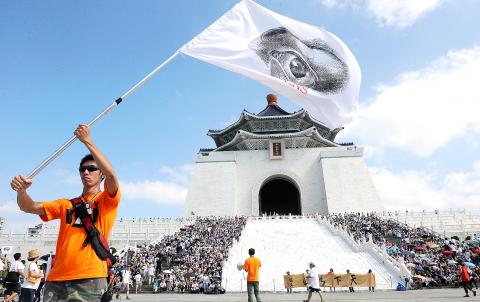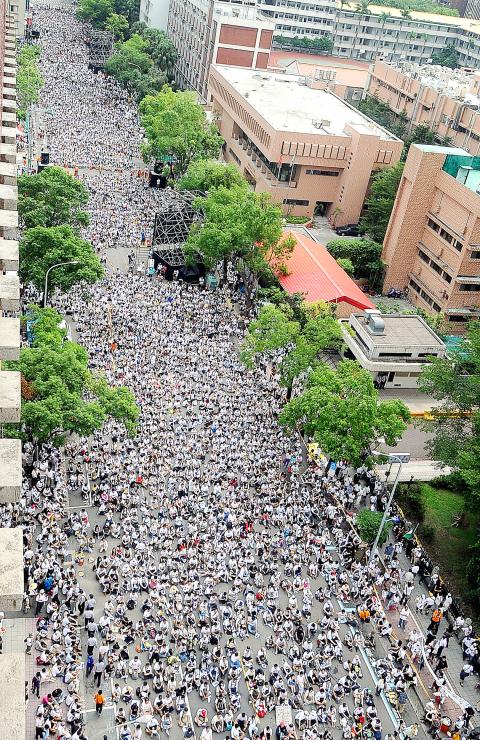With songs, chants, speeches and clashes, tens of thousands of people demonstrated at several locations near the Presidential Office Building on Double Ten National Day yesterday, calling on President Ma Ying-jeou (馬英九) to step down.
While different groups of demonstrators had different appeals — ranging from the fate of the country’s Fourth Nuclear Power Plant in Gongliao (貢寮), New Taipei City (新北市), to the government’s handling of an improper lobbying case allegedly involving major political figures — the call for Ma to step down was the common theme.
“A president who violates the Constitution like Ma should be ashamed of hosting a national day celebration,” said Dennis Wei (魏揚), a National Tsing Hua University graduate student and a member of a student group called “Black Island National Youth Front,” sitting in front of a line of police officers in front of the Presidential Office Building.

Photo: Liu Hsin-de, Taipei Times
He was referring to the Special Investigation Division’s alleged illegal monitoring of lawmakers’ telephones as well as Prosecutor-General Huang Shih-ming’s (黃世銘) report to the president on information gathered through wiretap.
Wei also accused the government of favoring large corporates by signing the cross-strait service trade pact and disregarding the suffering of ordinary people.
“The ruling elite headed by Ma and Premier Jiang Yi-huah (江宜樺) has lost its legitimacy and should therefore step down right away,” he said.

Photo: Fang Pin-chao, Taipei Times
Although the demonstration in front of the Presidential Office was peaceful, student protesters and the police engaged in serious clashes earlier in the morning when the police insisted that protesters remove a truck carrying loudspeakers, leaving several protesters and officers injured.
At a separate setting, a crowd of protesters rallied outside the Legislative Yuan at a demonstration organized by activist group Citizen 1985, calling for revisions of the Referendum Act (公民投票法), the Election and Recall Act for Public Servants (公職人員選舉罷免法), and regulations on election of legislators at-large to lower thresholds for public participation in the nation’s politics.
“When politicians in a democracy no longer listen to the people, we have the right to express our opinions through referendums, but referendums in this country have become a tool for large political parties. The threshold is so high that the only national referendums that ever made it to poll stations were those proposed by the Democratic Progressive Party, the Chinese Nationalist Party [KMT] and former president Chen Shui-bian (陳水扁),” said Huang Kuo-chang (黃國昌), an associate research fellow at Academia Sinica. “Of course the law needs to be amended.”
It is equally difficult for voters to recall elected officials, as the law also prohibits campaigns for a recall, he added.
“Politicians are allowed to launch election campaigns, but the people are prohibited from launching a recall campaign,” Huang said. “Do the politicians all think we the people are so stupid?”
At the rally, a white flag with a “citizen’s eye” on it was raised as a symbolic gesture to signify that people should take back the sovereignty of the citizenry.
Hu Shih-ho (胡世和), uncle of army corporal Hung Chung-chiu (洪仲丘) who allegedly died from abuse while serving in military, also showed up at the rally, panning the government for its slow probe into the death of his nephew despite Ma’s promises.
“Ma’s approval rating is now a little more than 9 percent, that means the people no longer trust him. Shouldn’t we take the power back from him?” Hu asked.
The crowd responded with a loud “yes.”
Later in the afternoon, the crowd moved to Liberty Square, where small forums were held to discuss various public issues.
Citizen 1985 said the rally drew 60,000 people, while police put the peak number at 10,000.
Separately, another group of protesters gathered outside the legislature, urging the government to hear the people’s call to abandon the controversial Fourth Nuclear Power Plant project, which the anti-nuclear activists said is a huge waste of taxpayers’ money and has been plagued by mishaps that could jeopardize public safety.
Additional reporting by CNA

CHAOS: Iranians took to the streets playing celebratory music after reports of Khamenei’s death on Saturday, while mourners also gathered in Tehran yesterday Iranian Supreme Leader Ayatollah Ali Khamenei was killed in a major attack on Iran launched by Israel and the US, throwing the future of the Islamic republic into doubt and raising the risk of regional instability. Iranian state television and the state-run IRNA news agency announced the 86-year-old’s death early yesterday. US President Donald Trump said it gave Iranians their “greatest chance” to “take back” their country. The announcements came after a joint US and Israeli aerial bombardment that targeted Iranian military and governmental sites. Trump said the “heavy and pinpoint bombing” would continue through the week or as long

TRUST: The KMT said it respected the US’ timing and considerations, and hoped it would continue to honor its commitments to helping Taiwan bolster its defenses and deterrence US President Donald Trump is delaying a multibillion-dollar arms sale to Taiwan to ensure his visit to Beijing is successful, a New York Times report said. The weapons sales package has stalled in the US Department of State, the report said, citing US officials it did not identify. The White House has told agencies not to push forward ahead of Trump’s meeting with Chinese President Xi Jinping (習近平), it said. The two last month held a phone call to discuss trade and geopolitical flashpoints ahead of the summit. Xi raised the Taiwan issue and urged the US to handle arms sales to

State-run CPC Corp, Taiwan (CPC, 台灣中油) yesterday said that it had confirmed on Saturday night with its liquefied natural gas (LNG) and crude oil suppliers that shipments are proceeding as scheduled and that domestic supplies remain unaffected. The CPC yesterday announced the gasoline and diesel prices will rise by NT$0.2 and NT$0.4 per liter, respectively, starting Monday, citing Middle East tensions and blizzards in the eastern United States. CPC also iterated it has been reducing the proportion of crude oil imports from the Middle East and diversifying its supply sources in the past few years in response to geopolitical risks, expanding

Pro-democracy media tycoon Jimmy Lai’s (黎智英) fraud conviction and prison sentence were yesterday overturned by a Hong Kong court, in a surprise legal decision that comes soon after Lai was jailed for 20 years on a separate national security charge. Judges Jeremy Poon (潘兆初), Anthea Pang (彭寶琴) and Derek Pang (彭偉昌) said in the judgement that they allowed the appeal from Lai, and another defendant in the case, to proceed, as a lower court judge had “erred.” “The Court of Appeal gave them leave to appeal against their conviction, allowed their appeals, quashed the convictions and set aside the sentences,” the judges